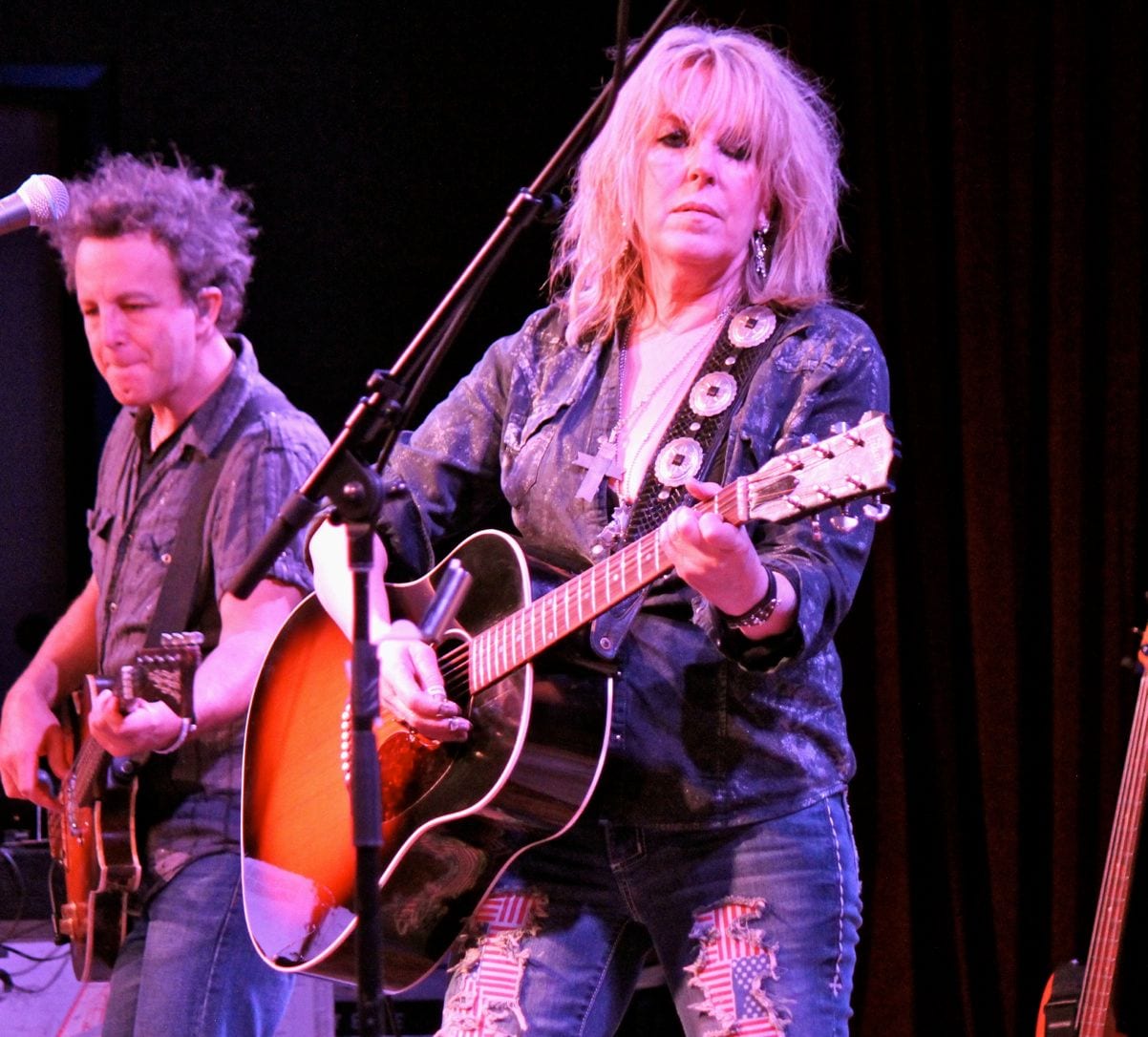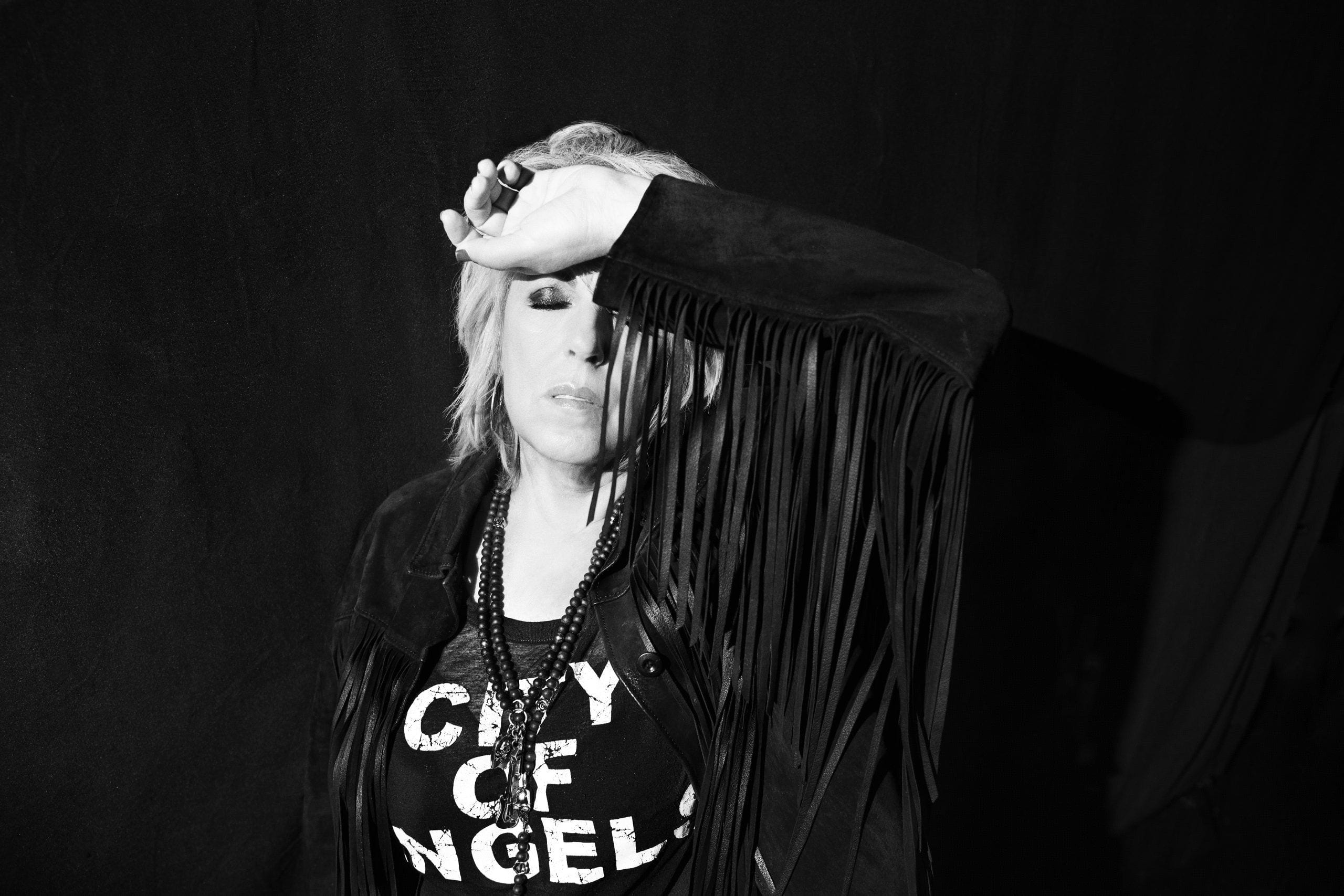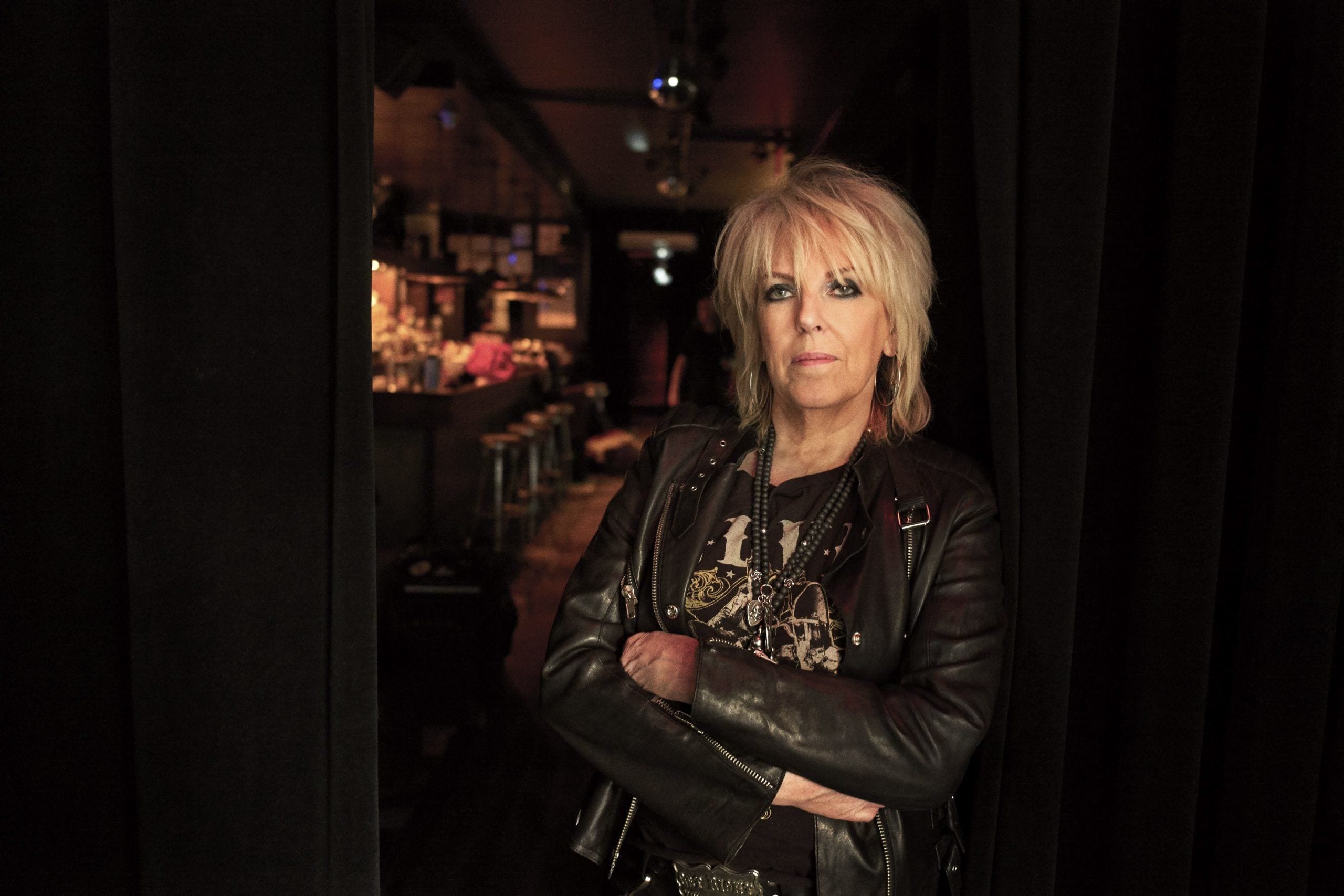
Though she has collaborated with many artists during a music career that goes back more than 40 years, roots wonder woman Lucinda Williams always seemed content to write all her material. That eventually would change with Williams‘ engagement, then 2009 marriage to Tom Overby. The man who manages her career not only developed a successful business and personal relationship with the Grammy-winning performer but did something that John Prine, Steve Forbert (and maybe several others) couldn’t do.
Though there’s no doubt who’s essentially behind the potent lyrics and hard-driving melodies of her riveting new album Good Souls Better Angels, Williams has put her faith and trust in Overby the songwriter, too. He shares cowrite credits on nine of the 11 tracks penned by Williams, with “Down Past the Bottom” by Greg Garing the lone outside contribution.
During a far-reaching phone interview on 13 April from their new home base in Nashville, where they are quarantined (and Overby was within earshot), Williams had much ground to cover beyond the album that is releasing today (24 April) on her label, Highway 20 Records. (See the PopMatters review here.)
She shared details of her rare co-writing experiences (including two that surprisingly didn’t work), paid tribute to late friends Prine and producer Hal Willner, and was feeling “pretty lucky” while dealing with the global pandemic. “I’m actually used to hunkering down in the house when I’m not on the road,” states Williams, who already is working to reschedule tour dates (she says her extended stay at City Winery in New York has been pushed back from May to mid-July) while keeping others on the books like the Kilkenny Arts Festival in Ireland set for 16 August.
“It’s not driving me crazy probably like it would with a lot of people ’cause I’m kind of like an indoors kind of person,” she adds.
Revealing that she has a serious case of Obsessive Compulsive Disorder — “it’s not a joke, like with some people,” Williams says — “my skin is all just cracked and dry. … I am OCD with germs and everything. So I was already washing my hands and using sanitizer more than other people anyway. And now I’m like, ‘Well, do I have to do it even more now?’ It gets confusing because you don’t know what the rules are.”
Since she and Overby admit to being “night owls”, their nightly routine is somewhat normal — for musicians: ordering dinner, watching Netflix or other TV channels, getting in bed to read until the wee hours, then waking up around noon or 1:00 in the afternoon.
“So I feel actually pretty lucky compared to other people who have a 9-to-5 job and they can’t go to work,” says Williams, whose Los Angeles-area home is being rented to friends. “To me, this feels more like when we’re between tours. The only difference being that we can’t go out with friends to restaurants and all that.”

Pen and partner
So Williams seems to be happy with her hubby always nearby to help — for instance, fact-checking some details she provides during phone interviews. Overby also has become a valuable writing partner. Williams designated her marriage as the tipping point for deciding “to learn how to write about different things besides unrequited love”.
Overby, who was a senior music buyer for Best Buy in the ’90s before getting involved in music management and becoming the owner of Hello Cleveland Management in 2007, was always interested in writing, Williams offers. “He would start coming up with these ideas,” she says. “And he was kind of shy about showing me anything at first. And then he’d walk in real quietly when I’d be working on something. He’d say, ‘You know, I got this idea for this song, and I got a title and a few lines if you want to just take a look at it and see what you think.’ He would always say, ‘Now you don’t have to use any of it. I just thought I’d show you.’ And then he got a little more confident about it.”
She recalls the first song where they successfully “saw the fruits of our labor” was for “Ghosts of Highway 20”, the title track of her 2016 double album. Initially hesitant to take his suggestions, Williams says, “He would kind of gently nudge me. It was good for me ’cause it got me out of my self, you know what I mean?”
Photo: Michael Bialas
Williams, who claims she doesn’t throw away any song idea (“I might have stuff going back 10 or 15 years that I still haven’t used yet”), brought back previously written or unfinished work to consider for Good Souls Better Angels. Overby contributed lines to complete some of her lyrics while also supplying principal ideas for songs like “Man Without a Soul”, her scathing verbal assault on the Man of the (White) House, and “Big Black Train”, a figurative locomotive barreling toward a destination called Depression.
“He was real modest about it,” Williams says of Overby’s suggestions. “He said, ‘Now, you don’t need to give me credit or anything. … It’s all about the song.’ And I said, ‘No, no. I want to give you credit. And he was a little shy about ‘What are people gonna think?’ and all that. And then I reminded him of the songwriting with Tom Waits and his wife, Kathleen. How they started working on stuff together. And I figured, ‘Well, if Tom Waits can do it, I could do it. If it’s OK for Tom Waits, it’s OK for me.’ “
Singing the “Bad News Blues”
Reunited with Ray Kennedy, who co-produced the new album with Williams and Overby and engineered her 1998 groundbreaking and Grammy-winning Car Wheels on a Gravel Road, she declares that coming up with protest or political songs is challenging, but “as long as [Donald] Trump’s been in the White House, and even before he was in there, we had things have been bad enough to write about.”
So, numbers like the explosive opener “You Can’t Rule Me”, “Bad News Blues”, and “When the Way Gets Dark”, all Williams/Overby cowrites, drive home an unsettling message to a world on the brink of disaster, even before the coronavirus outbreak.
They also co-wrote “Pray the Devil Back to Hell”, but your first guess on the song’s villainous protagonist probably will be incorrect. “I was influenced a lot obviously by Delta blues, especially Robert Johnson’s music, and the way you see the symbolism like a metaphor. Using the devil as a metaphor,” says the Woman With a Soul Purpose, who mentions Rev. Oris Mays’ “Don’t Let the Devil Ride” as a source of inspiration. “It’s about the devil trying to hitch a ride, like a hitchhiker. It’s kind of like the wolf-in-sheep’s-clothing thing. Like you don’t know who he might be.”
This devil isn’t anyone we know, though, she contends. “No. It’s just about the human condition,” adds Williams, who recorded the album over 15 days last fall with her three longtime band members — guitarist Stuart Mathis, bassist David Sutton, and drummer Butch Norton.
She also credits her husband for helping out on another recent song — “Lost Girl” — that played over the end credits for Lost Girls, a gripping crime drama that’s streaming on Netflix. Though the media company was planning to use her “Born to Be Loved” from 2011’s Blessed, Overby presented the idea of having a brand-new song — one that Williams had not written yet.
“That was pretty challenging,” Williams confesses. “I remember we had a deadline, and I mean we just got it in the nick of time. I still couldn’t figure out a melody, and I was frustrated and was going around and around and editing and re-editing the verses, and I think I was up all night till like 6:00 in the morning or something.”
When Overby gave thumbs-up to Williams’ final version, this couple of “night owls” thought the late hours justified the completion of another fruitful collaboration.
Prime-Time Prine
Williams has recorded with other major artists, including Nanci Griffith (“Wings of a Dove”), Elvis Costello (“There’s a Story in Your Voice”), and Willie Nelson (“Overtime”) over the years. But it’s her experience on John Prine‘s Grammy-nominated In Spite of Ourselves, a 1999 duets album that he said included “a small portion of my favorite country songs” with some of “my favorite girl singers”, that she particularly cherishes. Especially after the recent death of music’s folk hero.
We sat facing each other, which is kind of unusual,” Williams says of their “kind of down-to-earth recording” of “Wedding Bells/Let’s Turn Back the Years” from Hank Williams’ songbook. Working with Prine’s producer Jim Rooney, they only ran through it a couple of times, and while seeking perfection, she thought, “Aw, I wish he’d let me do one more take.”
Though still reeling from Prine’s passing on 7 April, she was stunned when told about Hal Willner, who died that same day, apparently suffering from COVID-19 complications. “With John, we knew he was in the hospital. … We were kind of preparing ourselves for the worst, but it was still really hard, of course,” Williams relates. “But with Hal (her producer on 2007’s West), that was just completely out of the blue. We didn’t know he had gotten the virus, we didn’t know anything until he was gone.”
She saw Prine for the last time in November for his inaugural All the Best Fest in Punta Cana, Dominican Republic. Both men received thoughtful tributes on Williams’ Facebook page, and she agreed during this interview to look back on more memorable moments she shared with Prine, whom she remembers meeting at a Canadian folk festival in the ’80s. “I have a picture of us just standing … posing for a picture, which I have to find somewhere,” Williams recalls. “It’s a great shot of us. … In the photograph, he’s smiling real big, and I was smiling. You know how he was. He was just friendly and sweet to everybody.”
That was almost as unforgettable as the time they didn’t write together, during the ’90s after she had made her first Los Angeles-to-Nashville move in 1992. “I had gotten invited over to John and his wife Fiona’s house and spent time with them over there,” Williams says. “They would have get-togethers and invite me over there. Sometimes I’d run into John at this place called the Sunset Grill. He’d be at the bar.
Photo: Danny Clinch / Courtesy of All Eyes Media
“We went to this studio that he had at Oh Boy Records, which was down at Music Row at the time. And I was working on ‘Drunken Angel,'” the song about Texas legend Blaze Foley that landed on Car Wheels on a Gravel Road. “I had been working on that song forever. It took a long time to finish.”
Saying, “I couldn’t imagine sitting in a room and writing a song from scratch with someone,” Williams decided to take “Drunken Angel” into her informal session with Prine. “And John came up with some great, some brilliant lines, but they were … I immediately realized … these were great lines for a John Prine song but not for a Lucinda Williams song. But we had the best time, and he laughed. He was so funny. Oh my God, he just had this dry, droll sense of humor. I feel really honored to have been able to spend that kind of time with him.”
No song emerged when she brought her guitar to Steve Forbert’s place in Nashville, either. “He just wanted to listen to these albums (he had just discovered) and drink beer,” Williams remembers with a laugh.
The fact that she defied the theory — put two great songwriters together and create a great song — with Prine and Forbert tickled her more than anything, though she reasoned that composers who perform their own songs are different from those who write for other artists.
Maybe a little bit of splendid isolation is required to achieve success. But now that Williams seems comfortable relying on her husband for more ideas and fine lines, she’s hopeful that they will keep getting the writing right. “Yeah, just see what happens,” Williams says. “He enjoys writing and poetry and everything, and I’m open to it, and it’s proven to work. And nobody seems to be freaking out about it.”
Punctuating that last remark with a hearty laugh, the 67-year-old artist who four decades ago wrote Happy Woman Blues all by herself might finally be home free.
Photo: Danny Clinch / Courtesy of All Eyes Media
- Lucinda Williams: Good Souls Better Angels | Music Review ...
- "In a Different Place Now": An Interview with Lucinda Williams ...
- Lucinda Williams: This Sweet Old World (review) - PopMatters
- Lucinda Williams: Blessed - PopMatters
- Lucinda Williams: Lucinda Williams (25th Anniversary) - PopMatters
- Lucinda Williams: The Ghosts of Highway 20 - PopMatters
- Lucinda Williams: World Without Tears - PopMatters
- An Interview with Lucinda Williams
- Lucinda Williams: Live from Austin, TX [DVD] - PopMatters
- Lucinda Williams: West - PopMatters





![Call for Papers: All Things Reconsidered [MUSIC] May-August 2024](https://www.popmatters.com/wp-content/uploads/2024/04/all-things-reconsidered-call-music-may-2024-720x380.jpg)



